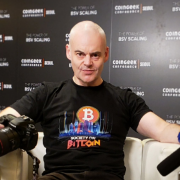For better or worse, the ongoing case between Ira Kleiman and Dr. Craig Wright has been the most fascinating event in the Bitcoin world for the past few years. This week it took another twist with the news that Ramona Ang, the wife of Dr. Wright, as trustee of the Tulip Trust, has launched a lawsuit against Kleiman over his alleged destruction of property and information that materially impacted something called the Tulip Trust. For the purposes of this case, everyone—from the plaintiff to the defendants and the courts—are accepting Dr. Wright is Satoshi Nakamoto as he has confirmed this under oath in this case and others.
The Tulip Trust itself has gained an almost mythic reputation in Bitcoin. Information about its exact nature—including whether it even exists, or exists in multiple forms—has trickled out over the years as judges and lawyers have examined evidence from the Kleiman/Wright case as part of the discovery process.
There’s a deeper background to the Tulip Trust story in this article. In this particular instance, the name “Tulip Trust” applies to a legal entity of which Ramona Ang is a trustee. From the complaint filed with the Southern District of Florida this week, it’s understood that Tulip Trust is a Seychelles-registered trust and Ang is a trustee. The coins subject to the lawsuit that Ang filed as trustee of the Tulip Trust are separate and apart from the Tulip Trust coins originally mined by Info Defence PTY LTD. while he was operating under the pseudonym of Satoshi Nakamoto.
There has also been much speculation over the years that Dave Kleiman and Dr. Wright had collaborated to create Bitcoin. The nature and extent of this collaboration is also largely unknown, given the conflicting accounts and allegations both parties and their supporters have made.
Ira Kleiman has admitted destroying documents and erasing/re-using several hard drives belonging to his brother, the late Dave Kleiman. Dave Kleiman was an esteemed information technology security researcher who had worked with governments and law enforcement and made several appearances on television as a security expert. He was also a close friend of Dr. Wright, and Craig Wright R&D had an interest in a company named W&K Info Defense Research LLC.
Ang’s complaint, as trustee of the Tulip Trust, based on Ira Kleiman’s own allegations, alleges that W&K’s records held documents, data and private keys “for the benefit of the Tulip Trust.” Ira Kleiman destroyed those records in the wake of his brother’s April 2013 death and “the Tulip Trust has suffered billions of dollars in damages in the form of bitcoins it can no longer access.”
Ira Kleiman has enough knowledge of computers and data records to understand that erasing hard drives (and subsequently re-using them) would render the data on those drives inaccessible permanently, the complaint says.
Outside of the allegations, there’s also the question of why Kleiman had such little regard for, or curiosity about, his brother’s life’s work that he would simply erase it. Regardless of their personal relationship (the two brothers had not interacted for years, despite living in the same area), he might have considered for a moment that his brother held information that could be important or useful to someone outside the family.
To understand all this, it’s necessary to go back over some of the key events in the past 12 years that led to the current situation. Here is a summary of the background and legal turning points along the way.
The significance of the Kleiman/Wright case to Satoshi Nakamoto’s identity
Most of the attention the press has given to this case over the years has not been on the merits of Ira Kleiman’s claims on Dr. Wright’s property—or the moral grounds he has to make this claim on behalf of his late brother, with whom he barely interacted.
Rather it has focused on Dr. Wright himself, his reputation and reliability, and claims to be Satoshi Nakamoto. This has resulted in the public learning many details about the early years of Bitcoin they wouldn’t have known otherwise, and probably only strengthened Dr. Wright’s Satoshi claims. That the plaintiffs have expended so much time, effort and money pursuing the case suggests they understand a very large amount of money is at stake; money that few other than Satoshi himself would have.
Perhaps realizing the irony of supporting Ira Kleiman’s side while understanding the implications its victory would have, BTC supporters have attacked Dr. Wright’s character at every turn, examining the minutiae of every document, email and sentence of witness testimony, desperately looking for a “gotcha moment” and declaring premature victory after judges’ decisions on procedural matters along the way. That way, they can make a tacit admission that Dr. Wright is Satoshi to potentially gain access to Satoshi’s fortune, while simultaneously casting doubt on his claims in the public eye.
Dave Kleiman
Dave Kleiman was a former soldier and law enforcement officer, and a computer forensics expert who had made multiple appearances at IT security conferences and on television. However, he was left paralyzed and wheelchair-bound following a 1995 motorcycle accident. Though his wellbeing began to decline from that time, he continued his IT security work at several companies. He formed a mostly-online friendship with Dr. Wright (though the two had met in person).
On April 26, 2013, Dave Kleiman died in what Ira Kleiman’s initial legal complaint described as “gruesome” circumstances. His official cause of death was natural causes related to MRSA infection complications, but there were several other signs in the house that he had lived his last months in a state of squalor, depression, and increasingly poor health. His body was discovered in a decomposing state, sometime after his passing.
Dr. Wright was distraught at the news of Kleiman’s death, having not known of his unfortunate state. He posted a video tribute to his friend, and later reached out to Dave’s family informing them that Dave may have held valuable information and potentially a significant amount of early bitcoins. Again, these coins are separate and apart from the Tulip Trust coins originally mined by Dr. Wright while he was operating under the pseudonym of Satoshi Nakamoto.
Rather than acknowledge this move as a gesture of goodwill, Ira Kleiman interpreted it instead as a scheme to acquire the rights to Dave’s property. Ira’s wish to “correct this injustice” forms the basis for the ongoing Kleiman/Wright case in Florida.
That initial complaint, filed on February 14, 2019, read:
This matter concerns the rightful ownership of hundreds of thousands of bitcoins and the valuable intellectual property rights of various blockchain technologies.
Recognizing that Dave’s family and friends weren’t aware of this, Craig perpetrated a scheme against Dave’s estate to seize Dave’s bitcoins and his rights to certain intellectual property associated with the Bitcoin technology.
Why Dr. Wright would need to concoct such a scheme and involve Dave’s family if the Kleimans were unaware of the existence of any of the above is also a mystery. Craig Wright R&D had already obtained a judgment from the Supreme Court of New South Wales in Australia return the company rights to Dave Kleiman’s share of W&K and its associated IP in return for forgiving debts in the amount of 300k Bitcoins. The rights to those 300k Bitcoin were retained by W&K. Had Dr. Wright never made contact with the Kleimans, this current legal battle would likely not exist.
Years of the case without a trial
We should point out that, as yet, there has been no “trial” or final decision in the Kleiman/Wright case. Decisions over the past three years have been recommendations or rulings on procedural matters and related cases.
Dr. Wright’s supporters initially predicted a swift result in his favor, saying Ira Kleiman had little evidence to support his claims. Mediation was set to happen on June 18, 2019. However new allegations, disputes over the integrity of testimony and documentary evidence, limited understanding of Bitcoin’s intricate workings, and Dr. Wright’s own access to vital information, have seen the case drag on for years. The effects of the COVID-19 pandemic have also played a part, limiting court time.
The jury trial and ultimate outcome has been delayed multiple times, and in November 2020 it was scheduled to begin in June 2021.
Over this time, both parties have at times taken actions to prompt a speedier outcome, or extend deadlines to produce certain information or wait for the results of related issues. Members of Dr. Wright’s family have been drawn into the affair as well, including his ex-wife Lynn Wright, who petitioned the court in July 2020 to determine who actually holds W&K’s beneficiary shares (and therefore rule that Ira Kleiman had no right to take any action on the company’s behalf).
Ira Kleiman filed a motion to dismiss Lynn Wright’s petition. Though this attempt was unsuccessful, the judge decided to stay that case until after a final decision is reached in the main Kleiman/Wright case—which effectively renders it irrelevant to that decision, though it may have an impact on what happens later.
The Tulip Trust’s new lawsuit creates another legal headache for Ira Kleiman, one that could result in penalties separate to the outcome of the main case.
Timeline of other significant events along the way
On June 20, 2019, Dr. Wright testified in a filing that he had mined the first 70 Bitcoin blocks. In the same filing, he said addresses beyond that block were held in a trust, “protected by a Shamir system” in which multiple parties held information that needed to be combined to access the coins.
The next month, Magistrate Judge Bruce Reinhardt ordered Dr. Wright to divulge his total bitcoin holdings as of December 31, 2011. In the same order (a recommendation to the main trial judge, Beth Bloom) he also cast several doubts on Dr. Wright’s integrity as a witness, rejected the notion that a “Tulip Trust” actually existed, and advocated dividing all bitcoins mined by Dr. Wright and Dave Kleiman 50/50 between Wright and Dave Kleiman’s estate.
On November 4, 2019, entrepreneur (and CoinGeek owner) Calvin Ayre revealed he’d been in negotiations to acquire Dave Kleiman’s estate—but had withdrawn after his team found no significant assets or IP. Dr. Wright was not involved in these negotiations, but Ayre’s team found the estate possessed only public Bitcoin addresses. Any private keys it may have held were destroyed when Ira Kleiman erased his brother’s hard drives.
Following much crowing from BTC supporters over Judge Reinhardt’s statements against Dr. Wright (which they frequently misinterpreted as a final decision) Dr. Wright began to fight back. In an editorial posted on January 3, 2020, CSW described Ira Kleiman as “one of the greediest people I have ever met” and “an idiot and a lowlife,” accusing him of attacking his companies, forging documents, conspiring with BTC Core personnel, and attempting to steal his life’s work.
At the start of 2020, attention shifted to the much-mocked idea that the Tulip Trust would receive vital information from a form of “bonded courier” that would either grant him access to a large amount of early bitcoins, and/or other data relevant to the case.
The mockery soon stopped after January 6, 2021 when it became apparent that such an event had actually happened. Dr. Wright produced a document that became known as “Tulip Trust III”. The exact contents of these records remains sealed, though subsequent events suggest it provided answers to questions over why Dr. Wright had been unable to produce clear records of his pre-2011 Bitcoin holdings.
On January 12, 2021, Judge Beth Bloom reversed most of Judge Reinhardt’s sanctions and recommendations against Dr. Wright. If new information was available, she said, Wright should at least be afforded the opportunity to gather and produce it.
By the end of January, Dr. Wright stated that he had “complied with the legal directives” required of him concerning the public keys in the case. In a statement to CoinGeek at the time, Dr. Wright explained: “The private keys were never a part of this and the court have accepted that the public keys can, at this time, be held confidentially and viewed only by those involved in the case.”
In May 2020 Dr. Wright went on the offensive against Ira Kleiman, filing a Motion for Summary Judgment and calling Kleiman’s case “an elaborate fiction”. The judge denied this motion.
Ira Kleiman then attempted to get a default judgment against Dr. Wright via a sanctions motion. Accusing Dr. Wright of perjury and forging documents used in evidence, he requested either a decision, or an official statement that his accusations be “deemed as established.”
Judge Bloom on June 25, 2020, also denied these requests, saying that Dr. Wright had indeed produced records of the trust’s Bitcoin holdings as requested, and that a jury would need to make the final decision. She set the trial to begin in July 2020, later delayed until August.
Throughout June 2020, various witnesses gave depositions to the court that revealed even more previously-unknown details in Bitcoin history. Witnesses included: Satoshi Nakamoto’s “chosen successor” as lead Bitcoin developer Gavin Andresen; Bitcoin Association President Jimmy Nguyen; journalists Brendan Sullivan and Andrew O’Hagan; and Dr. Wright’s current and former spouses Ramona Ang and Lynn Wright.
Dr. Wright’s maternal uncle, Don Lynam, also provided revealing details in his testimony about Dr. Wright’s early life and possible Bitcoin origins. Lynam is a former Royal Australian Air Force Wing Commander and Order of Australia medal recipient, with a prestigious reputation. He also noted that his father (and Dr. Wright’s grandfather) was Ronald Lynam—a World War II era signals intelligence officer and cryptology expert whose work remains largely officially classified.
It was in July 2020 that Lynn Wright entered the dispute, with her petition regarding W&K’s beneficiary shares. Then in September, both parties in the main Kleiman/Wright case requested to extend the pre-trial deadline and delay the trial until January 2021. Ira Kleiman had also filed a motion to dismiss Lynn Wright’s case. The judge did not dismiss that case, but on January 6, 2021 delayed it until after the main Kleiman/Wright decision.
On November 20, 2020, the court decided to delay the trial for the main Kleiman/Wright case until June 2021, due to limitations arising from the COVID-19 pandemic. Exhibit lists and objections were due by March 16, 2021, and all demonstrative and summary exhibits (evidence) are due by March 22. The parties will hold a conference call on May 11.
This legal process has been long and convoluted, with reports and commentary often tainted by their makers’ support for either the Kleiman or Wright side. The court has at times struggled to grasp important Bitcoin concepts, and even seasoned Bitcoin veterans must admit large gaps in their own knowledge of Bitcoin’s origins and early history.
Even if the case does manage to arrive at a decision in mid-2021, it’s unlikely to satisfy everyone. It’s also unlikely to result in definitive proof of Dr. Wright’s and Dave Kleiman’s role in Bitcoin’s creation, and who has the right to benefit from it. This case may eventually conclude and take its place in Bitcoin folklore, but the overall Bitcoin saga will continue (both in and out of court) for a long time to come.
New to blockchain? Check out CoinGeek’s Blockchain for Beginners section, the ultimate resource guide to learn more about blockchain technology.








